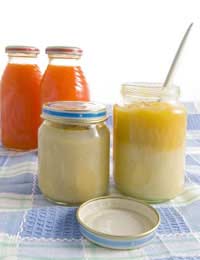Choosing a Vegetarian Diet for Kids

Vegetarianism is on the rise with people choosing a plant based diet for a number of reasons. Most often, those who avoid meat do so for one of two reasons: they either express concern for animals and animal rights or feel that a vegetarian diet plan is the most healthful for human consumption. Well chosen vegetarian meal plans are proven to help maintain healthy cholesterol levels as well as a reduction in the incidents of heart disease, diabetes, obesity and cancer. Parents who offer their children carefully planned vegetarian diets can help their kids on the path to developing life-long healthy eating habits.
Healthy Beginnings
In the beginning, babies are typically fed a diet of breast milk or commercially prepared baby formula. While breast milk is considered the ideal food for the first six months of life (or longer), some mothers opt for formula. Vegetarian mothers can select from the many high quality soy based formulas on the market today, avoiding those that are derived from cow's milk.At about six months of age, most babies begin to eat some solid foods in addition to the breast milk of formula. Recommended first foods are all vegetarian friendly, with most parents offering simple grain cereals, followed soon after by pureed vegetables and fruits. As babies outgrow the need for breast milk or infant formula, soy milk can serve as a nutritional beverage, with limited amounts of unsweetened fruit juice offered for variety.
Protecting Their Nutritional Status
Meat does provide some nutrients that the body needs, but when thoughtful substitutions are made, growing bodies can get all that they need without resorting to meat consumption.Iron-enriched cereals are a very good choice for vegetarian children, especially when served with foods high in Vitamin C, which aids in the absorption of iron. Vitamin B12 can be found in nutritional yeast, fortified cereals and breads, and even in soy or rice milk. Vitamin D is most plentiful in milk, which pure vegetarians avoid, or can be had from sun exposure. While the dangers of excessive sunning are widely known and all parents are cautioned to provide adequate sun protection for their children, limited (10-15 minutes daily) of early or late day sun can provide children with sufficient Vitamin D.
With careful planning, the nutritional needs of children can be easily met with a meat-free diet plan. Of course, a good quality children's multivitamin supplement may provide peace of mind for parents, vegetarian as well as those who feed a more traditional menu.
Fats and Proteins
While dietary fats are vital for children's growth and development, there is no need for them to consume animal fats, which are proven to contribute to elevated cholesterol levels and heart disease. Ideally, avocados, nuts, nut butters, and soy products are utilised to ensure that vegetarian children get adequate fat in their diets. There are a number of kid-friendly soy based products, including "hamburgers, "sausages," and "chicken patties" that are delicious and meat-free.When non-vegetarians express doubts about the appropriateness of a meat-free diet, protein is a common concern. Ample protein is found in vegetables, beans, fruits, legumes, and whole grains, making it easy for vegetarians to consume adequate dietary protein.


Re: Superfoods on a Budget
I just checked out these fantastic tips for buying superfoods on a budget! Eating healthy doesn’t have to be expensive. Can’t wait to try…
Re: Fun Facts: How Many Calories Does a Child Burn?
hi, im eleven yrs. I weigh about 100 lbs and believe I am over the normal weight. I am about 4’10 ft. I…
Re: Fun Facts: How Many Calories Does a Child Burn?
I want to clear this up for everybody worried about their weight, especially at a young age you shouldn’t…
Re: Dealing with a Child that is Always Hungry
I am the great grandmother of an 8 year old that I mostly take care of her mom is around but she totally depends…
Re: Fun Facts: How Many Calories Does a Child Burn?
I’m 11 years old and recently got a smart watch. This isn’t a big question but I can’t find how many…
Re: Dealing with a Child that is Always Hungry
I'm immediately suspicious of an article that suggests cereal as a healthy snack. Cereal (especially cereal…
Re: Fun Facts: How Many Calories Does a Child Burn?
How many calories SHOULD an average twelve year old burn daily???
Re: Fun Facts: How Many Calories Does a Child Burn?
I'm 9 years old and I'm trying to set up a health journal but I don't know how many calories I should…
Re: Fun Facts: How Many Calories Does a Child Burn?
Hiw much calories should an average 10 year old burn a day?
Re: Dealing with a Child that is Always Hungry
I’m 16 and my sister is 11 years old 57 inches and weighs 90 pounds she only drinks like 2 or 3 16 ounce bottles…